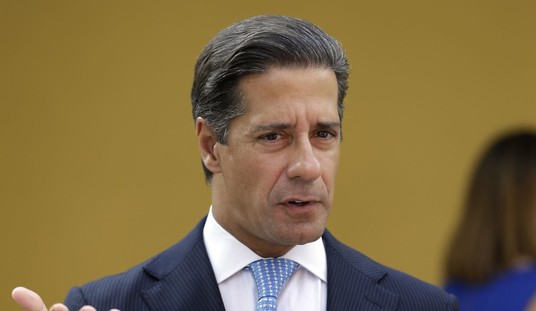Normally, I’m a fan of Tim Pawlenty. He operates as conservatively as possible in a progressive state, and while that may not satisfy movement conservatives, his cool competence and political infighting skills have kept this state from becoming a midwestern California the past seven years. But every once in a while, he makes a big misstep, and it’s difficult to defend him from well-deserved brickbats.
Like, say, today — as the Boss notes:
The cost of each gallon of gas includes 18.4 cents to fund federal highway programs, and another 25.5 cents for roads in Minnesota.
But as cars and trucks get better mileage, the gas tax isn’t keeping pace with the need for roads and road work. So another option is gaining traction in Minnesota — a high-tech mileage-based user fee.
“We realize that in the future, cars aren’t going to be powered by fuel, probably,” said Gov. Tim Pawlenty, who signed into law $5 million for the current biennium to study the mileage tax.
Pawlenty said the state is now working on a pilot program to try it out, with an eye toward cars that aren’t even on the road yet.
“They’re going to be powered by different things, perhaps including hydrogen fuel cells, potentially plug-in electrics, potentially other sources of energy,” Pawlenty said. “So we need to think about how we’re going to pay for transportation down the road.”
We erupted in anger when Barack Obama’s Transportation Secretary, Ray LaHood, trotted out this idea — and for good reason. At the time, I pointed out the worst problems with this idea:
The mileage tax as a replacement for the gas tax is a bad idea on several levels. First, collection of the gas tax is relatively easy and uncomplicated; it’s levied at the pump and requires no particular compliance for tens of millions of drivers nationwide. It costs the federal government very little to collect and its enforcement is limited to the much lower number of fuel stations, rather than all of the drivers and autos in the US.
LaHood’s suggestion would be an enforcement and logistical nightmare. A mileage tax would require the installation of GPS equipment on every motor vehicle and an enforcement bureaucracy to ensure that drivers didn’t disable it. The cost of the devices would run to the billions just on the initial rollout. The Obama administration would have to spend more millions, if not billions, tracking the mileage on all of these cars.
The privacy implications are the worst aspect of the idea. The government would have a database tracking all of our movements, at least those made in personal vehicles, for their use. At the end of the year, when we had to account for this tax, we would have no practical way of challenging the government data on which we’d be taxed. Can you imagine having to produce a record of every single car trip you took in 2008 for an audit? The tax burden would only come at the end of the year, in a balloon payment.
All of that applies to a state mileage tax as well. It doesn’t take a $5 million study to understand how much of a burden this would be on Minnesotans. Had Governor Pawlenty invited me to the mansion, I could have explained it to him, and I’d have only needed a cup of coffee and a nice, light lunch. I’d have even skipped the lunch.
The state wonders where it will get its revenue if gasoline becomes obsolete. I’d revert the tax to the energy sources, such as the sale of hydrogen fuel cells, hydrogen itself, car batteries, etc, just for the sake of practicality. Better yet, maybe we can look at reductions in government spending instead of finding ways to replace the lost revenue.
A bad idea is a bad idea, no matter who proposes it. Let’s kill this one before it grows.








Join the conversation as a VIP Member